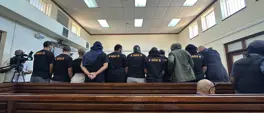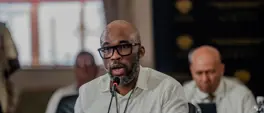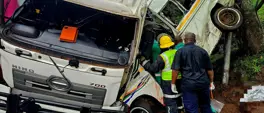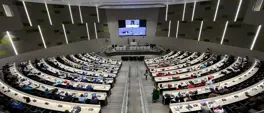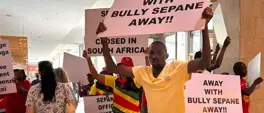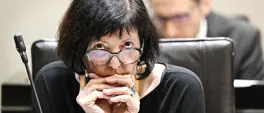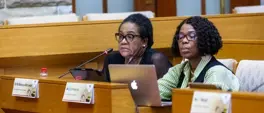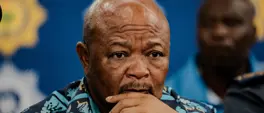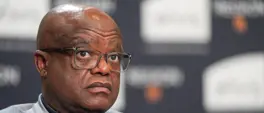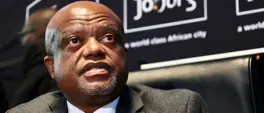SIU finds work paid for but not done on critical water infrastructure
Steve Kretzmann, GroundUp
5 June 2025 | 10:30Criminal investigations, civil litigation, lifestyle audits, and disciplinary action loom large as SIU probes dodgy water sector contracts.
- Special Investigating Unit (SIU)
- Department and Water and Sanitation
- National Prosecuting Authority (NPA)
- Standing Committee on Public Accounts (SCOPA)
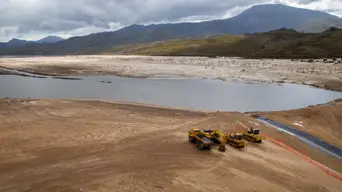
Theewaterskloof Dam on 24 April 2018. The City of Cape Town wants to build a water recycling plant in Faure to minimise the risk of running out of water during a drought. Picture: Ashraf Hendricks/GroundUp
The Special Investigating Unit (SIU) is pursuing civil litigation to set aside and recover all payments made for a contract involving repairs to a critical pump station, and the design, supply, and installation of a water treatment plant in Mpumalanga.
The Grootfontein pump station is critical to supply water via a wider dam system to numerous power stations, while Grootdraai pumps water from the Grootdraai dam near Standerton.
The SIU updated Parliament’s Standing Committee on Public Accounts of findings on five active investigations in the water sector on Wednesday. SIU chief national investigations officer Zodwa Xesibe told the committee that Constitutional procurement obligations had been violated.
Xesibe said various procurement irregularities were found, with “possible fraudulent claims” paid for repairs at the Grootfontein pump station.
“It appears the service provider was paid R1.1-million for work that was never performed,” she said.
She said it appeared the payment system had been manipulated to create purchase orders after the contract had expired, and the department incurred “potential irregular expenditure” by making “two sundry payments” amounting to just under R16-million.
The SIU was pursuing civil litigation to set the contract aside and recover all payments. The SIU is also supporting the Department of Water and Sanitation (DWS) in a criminal case opened in relation to the Grootfontein and Grootdraai contract.
She said the Department of Water and Sanitation’s Chief Financial Officer – Frans Moatshe – had been referred for disciplinary action for his involvement in irregular payments, along with the procurement manager and Standerton manager.
But DWS spokesperson Wisane Mavase said Moatshe had been cleared, as he had provided proof that he had followed correct procedures. Mavase said the SIU’s report stated Moatshe had appointed a service provider who did not respond to the Request for Quotation. In response to disciplinary procedures, he provided two forms of proof the company had responded. She said the SIU had been told Moatshe had been acquitted.
WATER BOARDS UNDER FIRE
The Grootfontein/Grootdraai contract is one of five currently under investigation, the SIU having last month presented on 14 other completed water sector investigations.
Also currently under investigation are Amatola Water Board and the Lepelle Northern Water Board. Combined, the investigations into the two water boards have resulted in 48 matters being referred to the NPA for prosecution. Three supply chain management officials in the Amatola Water Board have been referred for disciplinary procedures, while civil litigation is underway to recover R107-million of a civil engineering management contract with the Lepelle Northern Water Board.
ROOIWAL SEWAGE TREATMENT WORKS
Blackhead Consulting, headed by Edwin Sodi who faces corruption charges in the Free State asbestos contract scandal, is in the SIU’s crosshairs for abandoning the upgrades to the Rooiwal Wastewater Treatment Works in Tshwane.
Blackhead, in a joint venture with CMS Water Engineering and NJR Projects, won the tender for the Rooiwal phase 1 upgrade. But Xesibe told Parliament they failed to perform and eventually abandoned the site, resulting in the Tshwane Metropolitan Municipality cancelling the contract in July 2022 with R147-million having been paid to the joint venture.
The dysfunctional wastewater treatment works is believed to have contributed to the death of 29 people in a cholera outbreak in Hammanskraal in 2023.
So far, Xesibe said, four incidents of fraud related to the botched Rooiwal upgrade had been referred to the NPA, and SARS had been alerted to non-compliance with tax regulations.
She said in the relation to the Rooiwal debacle, 65 “roleplayers”, being officials, private persons, and entities, had been identified for “high-level profiling”, with 27 officials having been “red-flagged for further lifestyle analysis due to assets purchased and/or living beyond their means”.
DEPARTMENTAL CAMPAIGNS
The SIU is also investigating three major DWS campaigns, being the Drop the Block campaign to save water by putting a block in the toilet cistern, the Almost Empty Outdoor Campaign, and the War on Leaks campaign to train thousands of artisans and plumbers to fix leaks in their communities.
Sedibeng Water was contracted for Drop the Block and Almost Empty, having been paid R210-million and R10-million for the respective campaigns.
Rand Water was partially involved in the War on Leaks initiative. The total budget for this ballooned from an initial R2.2-billion to R4.7-billion so far.
Xesibe said the Drop the Block service provider appointments were done by Lepelle Northern Water and thereafter ceded to Sedibeng Water. She said the investigation was limited to Sedibeng Water but the SIU had approached the Office of the Presidency for an extension to their proclamation in order to focus on the reasons and procedures of the transfer to Sedibeng Water.
She said the SIU had found that Sedibeng Water’s appointment as implementing agent on the Almost Empty campaign was “contrary to legislation and DWS policy prescripts”. Further, Sedibeng Water had appointed a service provider by going through emergency procurement procedures without due cause, which made the appointments irregular. There were also overpayments and incorrect VAT charges in Sedibeng Water’s invoices to DWS.
In the War on Leaks campaign, Xesibe said Rand Water had been paid R1.7-billion, R40-million of which was for “unexplained and unsubstantiated contingency fees”.
The Energy and Water Sector Education Training Authority (EWSETA) had also been contracted in the campaign, and the SIU was looking into the deals they had made with service providers.
The high-level profiling of 29 role players in the War on Leaks campaign was “progressing well”, said Xesibe.
She said the SIU’s fifth and latest investigation was into the Ethekwini Municipality’s provision of water and sanitation services to human settlements and schools. The scoping phase had been completed and the investigation had commenced, she said.
WATER TANKER MAFIA
MK party MP Emerald Madlala urged the SIU to investigate the use of water tankers to provide drinking water to villages in rural areas. Madlala said “water tanker mafias” closed or vandalised drinking water supplies so they could get “quick cash from an emergency situation”.
“It’s a national crisis, it needs a thorough and in depth investigation,” he said.
Xesibe said the matter was “a serious concern” but the SIU could only obtain proclamations from the Presidency if they received serious allegations or a referral from SCOPA or the DWS itself, which allowed them to draft a motivation.
SCOPA chair Songezo Zibi (Rise Mzansi) said a recent visit to the OR Tambo District Municipality in the Eastern Cape revealed that water tankers were “a money spinner” while water infrastructure did not get built.
SIU Chief Operations Officer Leonard Lekgetho said a Water Anti-Corruption Forum had been established on 14 May, and it was hoped people would use the forum to provide information on which the SIU, or the police, could act.
“We hear a lot about it, where they (water tanker operators) even break the taps so they can be hired to deliver water,” said Lekgetho.
Get the whole picture 💡
Take a look at the topic timeline for all related articles.

